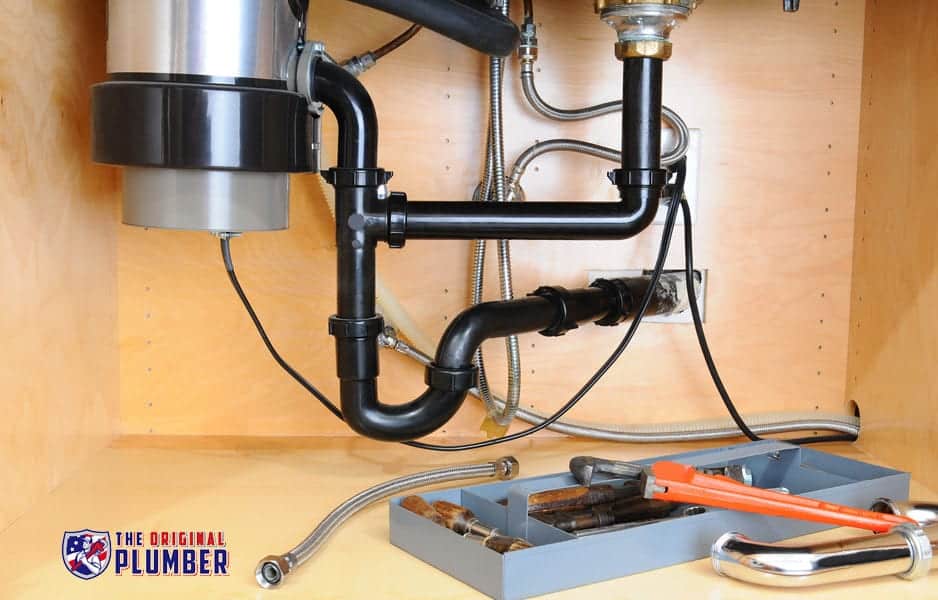Using a garbage disposal with a septic tank is perfectly okay if you take the proper precautions. It’s not as simple as using your garbage disposal whenever you want! Understanding how your septic system works is crucial – especially if you’re using a garbage disposal unit.
When you’re on a public sewer system, the city pays for all maintenance. So in that situation, you don’t need to worry about how often you use your garbage disposal. But when you are using a septic tank system, the maintenance and responsibility falls on the homeowner.
You can use a garbage disposal if your home has its own septic tank, but you should consider the following information to ensure you don’t accidentally cause a sewage backup.
Use Your Garbage Disposal Sparingly
The more you use your garbage disposal, the more waste builds up in your septic tank. Functioning septic tanks separate waste solids and liquids while flushing out wastewater into the drain field. Solids sink to the bottom of the tank, while liquids float to the top.
Over time, solids build up in the tank. Regularly pumping out solids helps keep the septic tank from overflowing. Unfortunately, the food and particle waste you grind up in the garbage disposal ends up as solid.
To keep your garbage disposal septic tank from overflowing prematurely, you should be mindful when using the garbage disposal. Consider throwing large pieces of food (dense meat chunks or fat, bones, vegetable peelings, etc.) into the kitchen’s garbage cans or compost pile to reduce the amount of solids that ends up in your septic tank.
Use your disposal to grind up small pieces of food or to dispose of thin liquids like sauces, gravies, and soups, as these items decompose easily and produce less waste.
Be Careful About What Goes Into Your Garbage Disposal
When using your disposal, take care to remove utensils, small toys, jewelry, and other hard materials from the sink to prevent these items from clogging your drain, sewer pipe, and septic tank.
Don’t grind glass, plastic, metal, paper, or other materials. These can damage your system. Non-food items should go in the trash.
If you notice a lingering odor, frequent clogs, or your kitchen sink drains more slowly than usual, call a plumber. These are signs that you may have a clog.
Tips for Putting Food Waste In Your Garbage Disposal
If you have a septic tank, it’s important to not just dump food down the drain – even if you have a garbage disposal. We recommend making sure biodegradable food waste is broken up into smaller pieces before you put it down the drain. This can help prevent clogs and backups.
Avoid grinding up sticky substances like gum, glue, and soft rubber items. Sticky substances trap food scraps, which can lead to sewer pipe clogs. You should also never put waste, like cigarette butts or paper towels, down the garbage disposal.
You should avoid flushing cooking oil, fats, and other slick liquids down your garbage disposal. When you pour oil or grease down the drain, they can solidify. Then they can clog drains.
Oils, gats, and grease can trap food waste. Trapped food scraps can cause the garbage disposal’s septic tank to malfunction. Running cold water while you grind food helps prevent clogs, but over time the clogs can still slowly accumulate.
Food Scraps to Avoid Putting In The Garbage Disposal
For homes with septic tanks, we recommend throwing these food scraps away in a trash can or compost bin. For the safety of your septic system, do not put these down the garbage disposal:
- Coffee grounds: Even though coffee grounds are very fine, they form a sticky paste after you brew them.
- Pasta, bread, or rice: These expandable foods all absorb water. This can lead to a clog.
- Larger animal bones: Your garbage disposal’s impellers are likely not strong enough to handle how hard animal bones are. If a tiny amount of fish bones makes its way down while you’re cooking, that’s okay. But be careful of larger bones.
- Fruit pits and seeds: Similarly to a large animal bone, your garbage disposal blade may not be able to handle a peach or avocado pit.
- Shells or nuts: Nuts and shells can damage your garbage disposal in one of two ways. They either are too hard for most garbage disposals to handle, which can damage the system. Or, if it’s a softer nut like peanuts, they can be ground into a paste-like substance.
- Eggshells, onion layers, and stringy vegetables: Do not grind fibrous materials. They can wrap around your system rather than be ground down by it. This includes corn husks, celery, and artichokes.
Should I Use Enzymes or Chemicals to Help Break Down Solid Waste?
Newer septic assist garbage disposal systems recommend the use of enzymes and chemicals. You can also buy garbage disposal with these features built in. These chemicals claim to help break down the solids in your septic tank.
Unfortunately, some of these enzymes and chemicals interfere with the natural bacteria in your tank. Too much organic matter can disrupt the tank’s bacteria that helps your septic system properly function. They can slow the breaking down of solids rather than help to speed up the process.
In most cases, you can help the bacteria in your tank by limiting septic garbage disposal usage. Make sure you don’t accidentally grind up hard metals and other objects. Plus, stay on top of scheduling routine septic tank maintenance to prevent larger issues.
When you do put items down your garbage disposal, make sure you use cold water. It can help the greases and fats that may have snuck in solidify so it can be properly broken up.
Pro tip: When you’re washing dishes, put a little dish soap in the garbage disposal. Run it for about a minute with cold water.
How Often to Schedule Septic Tank Pumping
As a rule, most septic tanks require pumping every three to five years. This depends on the tank size and average water usage. If you run your garbage disposal regularly, you may need to schedule more frequent pumping for your tank.
The Original Plumber & Septic can tell you how often to have your septic tank pumped. We can help make sure you’re getting the septic system pumped often enough if you have a garbage disposal. We understand that you may prefer to grind up all of your food waste using a garbage disposal unit. After all, one of the main perks of a garbage disposal unit is the convenience!
We can provide tips and guidance in maintaining your disposal and recommend the appropriate times to schedule a septic tank pumping.
Call The Original Plumber & Septic for Regular Septic Tank Maintenance
We proudly serve Metro Atlanta and surrounding areas. We routinely perform septic tank inspections, repairs, and maintenance for our customers to help prevent costly backups.
Contact us today to learn more about how we can help you maintain a functioning septic system. We’re open seven days a week so we can work with your schedule. We also provide emergency services.
Frequently Asked Questions
How long does a garbage disposal last?
Most garbage disposals last around 10 years. With time, your disposal’s grinding ability may start to diminish. Once they reach around 10 years old, you may notice it start to fail or clog more easily.
What are the signs of a failing garbage disposal?
If you suspect your garbage disposal needs repair, keep an eye out for the following signs:
- Loud, unusual noises
- Unexpected and unexplained clogs
- You need to reset the garbage disposal frequently
- If the unit fails to turn on
- Odors that persist after cleaning
- Water leaks beneath your sink, by the cabinet, or beneath the disposal unit
- Slow, poor performance
Are garbage disposals bad for septic systems?
If you are proactive about regular septic tank maintenance, you should not have anything to worry about. However, you may run into more problems if you do not schedule routine maintenance.
Liquid waste and solid waste are separated in your septic tank. Solids sink to the bottom of the tank. As your scum layer grows, your septic system’s capacity decreases. Bacteria helps to decrease the solid layer, but it can not work through all of it! Regular septic pumping helps to make sure the layer of solids at the bottom does not become too much for the system.
Ground-up food particles from the garbage disposal make their way into septic systems. This contributes to the layer of solids at the bottom of your septic tank. If you use your garbage disposal frequently, it can mean you need more frequent pumping to keep your septic system healthy.




